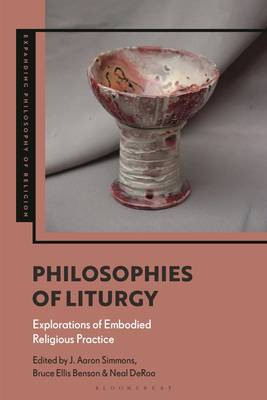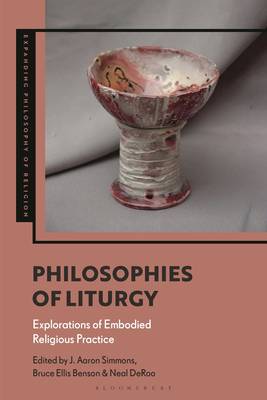
Bedankt voor het vertrouwen het afgelopen jaar! Om jou te bedanken bieden we GRATIS verzending (in België) aan op alles gedurende de hele maand januari.
- Afhalen na 1 uur in een winkel met voorraad
- In januari gratis thuislevering in België
- Ruim aanbod met 7 miljoen producten
Bedankt voor het vertrouwen het afgelopen jaar! Om jou te bedanken bieden we GRATIS verzending (in België) aan op alles gedurende de hele maand januari.
- Afhalen na 1 uur in een winkel met voorraad
- In januari gratis thuislevering in België
- Ruim aanbod met 7 miljoen producten
Zoeken
Philosophies of Liturgy
Explorations of Embodied Religious Practice
€ 296,95
+ 593 punten
Omschrijving
Mainstream philosophy of religion has primarily focused on the truth and justification of religious beliefs even though belief is only one small facet of religious life. This collection remedies this by taking practice and embodied action seriously as fundamental elements of any philosophy of religion.
Emerging and established voices across different philosophical traditions come together to consider religious actions, including public worship, from perspectives such as trauma and social ontology, sound and silence, and knowledge and hope. Embodied religious practice is viewed through the lens of liturgy, intrinsically connecting religious rituals to human existence to show clearly that, no matter where one finds oneself in terms of the so-called 'analytic-continental' divide, philosophy of religion must be concerned with more than just beliefs if it is to adequately deal with the subject matter of 'religion.'
The purpose of these studies is not to reject what has gone before but to expand the focus of philosophy of religion. This approach lays the groundwork for investigations into how beliefs are situated in our theological, moral, and social frameworks. For any philosophy of religion student or scholar interested in how thinking and living well are intimately related, this is a go-to resource. It takes seriously the importance of historical religious traditions and communities, opening the space for cross-cultural and interdisciplinary debates.
Emerging and established voices across different philosophical traditions come together to consider religious actions, including public worship, from perspectives such as trauma and social ontology, sound and silence, and knowledge and hope. Embodied religious practice is viewed through the lens of liturgy, intrinsically connecting religious rituals to human existence to show clearly that, no matter where one finds oneself in terms of the so-called 'analytic-continental' divide, philosophy of religion must be concerned with more than just beliefs if it is to adequately deal with the subject matter of 'religion.'
The purpose of these studies is not to reject what has gone before but to expand the focus of philosophy of religion. This approach lays the groundwork for investigations into how beliefs are situated in our theological, moral, and social frameworks. For any philosophy of religion student or scholar interested in how thinking and living well are intimately related, this is a go-to resource. It takes seriously the importance of historical religious traditions and communities, opening the space for cross-cultural and interdisciplinary debates.
Specificaties
Betrokkenen
- Uitgeverij:
Inhoud
- Aantal bladzijden:
- 328
- Taal:
- Engels
- Reeks:
Eigenschappen
- Productcode (EAN):
- 9781350349223
- Verschijningsdatum:
- 27/07/2023
- Uitvoering:
- Hardcover
- Formaat:
- Genaaid
- Afmetingen:
- 156 mm x 234 mm
- Gewicht:
- 630 g

Alleen bij Standaard Boekhandel
+ 593 punten op je klantenkaart van Standaard Boekhandel
Beoordelingen
We publiceren alleen reviews die voldoen aan de voorwaarden voor reviews. Bekijk onze voorwaarden voor reviews.








